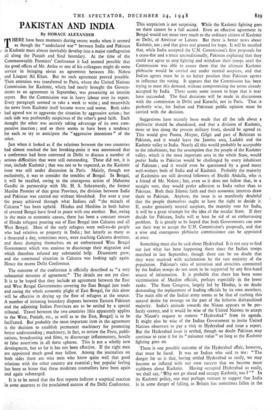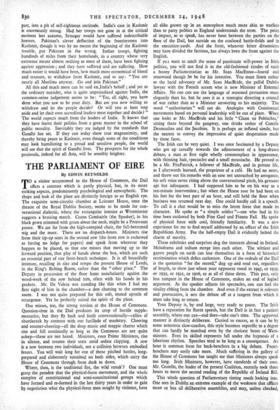PAKISTAN AND INDIA
By HORACE ALEXANDER
THERE have been moments during recent weeks when it seemed as though the "undeclared war" between India and Pakistan I., in Kashmir must almost inevitably develop into a major conflagration all along the Punjab and Sind boundary. At the time of the Commonwealth Premiers' Conference it had seemed possible that the good offices of Mr. Attlee or one of his colleagues might do some service in bringing about an agreement between Mr. Nehru and Liaquat Ali Khan. But no such agreement proved possible.
I Then attention was transferred to Paris, where the United Nations Commission for Kashmir, which had nearly brought the Govern- ments to an agreement in September, was presenting an interim report. But the Commission was in heavy labour over its report. Every paragraph seemed to take a week to write ; and meanwhile the news from Kashmir itself became worse and worse. Both sides r had agreed not to aggravate the situation by aggressive action ; but each side was profoundly suspicious of the other's good faith. Each thought the other was secretly taking advantage of its own com- parative inaction ; and so there seems to have been a tendency for each to try to anticipate the " aggressive intentions " of the other.
just when it looked as if the relations between the two countries had almost reached the last breaking-point it was announced that a conference had been convened in Delhi to discuss a number of serious difficulties that were still outstanding. These did not, it is true, include Kashmir ; that was not to be expected, as the Kashmir issue was still under discussion in Paris. Mainly, though not exclusively, it was to consider the troubles of Bengal. In Bengal, it will be recalled, owing to the courageous action of Mahatma Gandhi in partnership with Mr. H. S. Suhrawardy, the former Muslim Premier of that great Province, the division between India and Pakistan was carried out without bloodshed. For over a year the peace achieved through what Indians call " the miracle of Calcutta " has been upheld. Hindus and Muslims in both halves of severed Bengal have lived in peace with one another. But, owing in the main to economic causes, there has been a constant stream of Hindu refugees pouring out of East Bengal into Calcutta and all West Bengal. Most of the early refugees were well-to-do people who had relatives or property in India ; but latterly as many as a thousand a day, sometimes more, were reaching Calcutta destitute, and there dumping themselves on an embarrassed West Bengal Government which was anxious to discourage their migration and which therefore refused any substantial help. Discontent grew, and the communal situation in Calcutta was looking ugly again. Hence the recent Delhi Conference.
The outcome of the conference is officially described as "a very substantial measure of agreement." The details are not yet clear. It is to be hoped that they include an agreement between the East and West Bengal Governments covering the East Bengal jute trade and easing the whole economic plight of East Bengal, for this alone will be effective in drying up the flow of refugees at the source. A number of irritating boundary disputes between Eastern Pakistan and the adjoining Indian Provinces are to be settled by a special tribunal. Travel between the two countries (this apparently applies to the West, Punjab, etc., as well as to the East, Bengal) is to be facilitated. But probably the most important item in the agreement is the decision to establish permanent machinery for promoting better understanding ; machinery, in fact, to review the Press, publi- cations, broadcasting and films, to discourage inflammatory, hostile or false assertions in all these spheres. This is not a wholly new development, but so far it has not been effective. If the right men are appointed much good may follow. Among the journalists on both sides there are wise men who know quite well that good relations with the other country are essential ; but popular feeling has been so bitter that these moderate counsellors have been again and again submerged.
It is to be noted that the first reports indicate a sceptical reaction in some quarters to the proclaimed success of the Delhi Conference. This scepticism is not surprising. While the Kashmir fighting goes on there cannot be a full accord. Even an effective agreement in Bengal would not mean very much to the ordinary citizen of Kashmir or Delhi, of Amritsar or Lahore. But there is better news about Kashmir, too ; and that gives real ground for hope. It will be recalled that, while India accepted the U.N. Commission's first proposals for a cease-fire and a truce unconditionally, Pakistan explained that they could not agree to stop fighting and withdraw their troops until the Commission was able to assure them that the ultimate Kashmir plebiscite would be carried out under neutral auspices, and that Indian .agents must be in no better position than Pakistan agents to influence the voting. It appears that the Commission has been trying to meet this demand, without compromising the terms already accepted by India. There seems some reason to hope that it may have succeeded. The final decisions will be made in discussions with the commission in Delhi and Karachi, not in Paris. That is probably wise, for Indian and Pakistani public opinion must be carried with the decision.
Suggestions have recently been made that all the talk about a plebiscite should be abandoned, and that a division of Kashmir, more or less along the present military front, should be agreed to. This would give Poona, Mirpur, Gilgit and part of Baltistan to Pakistan, and it would leave the Jammu area, Ladakh and the Kashmir valley to India. Nearly all this would probably be acceptable to the inhabitants, but the assumption that the people of the Kashmir valley, which is the most important area in the whole State, would prefer India to Pakistan would be challenged by every inhabitant of Pakistan ; and it would even be questioned by a good many well-wishers both of India and of Kashmir. Probably the majority of Kashmiris are still devoted followers of Sheikh Abdulla, who is a friend of Mr. Nehru ; but, even so it does not follow that, in a straight vote, they would prefer adhesion to India rather than to Pakistan. Both their Islamic faith and their economic interests draw them to Pakistan. Anyhow, the issue is so manifestly doubtful that the people themselves ought to have the right to decide it. If, under genuinely neutral auspices, the majority vote for India, it will be a great triumph for the idea of the secular State. If they decide for Pakistan, India will at least be rid of an embarrassing problem. It is greatly to be hoped that both Governments can now see their way to accept the U.N. Commission's proposals, and that a wise and courageous plebiscite commissioner can be appointed at once.
Something must also be said about Hyderabad. It is not easy to find out just what has been happening there since the Indian troops marched in last September, though there can be no doubt that they were received with acclamation by the vast majority of the population. Pakistan's tales of terrorism and atrocities committed by the Indian troops do not seem to be supported by any first-hand source of information. It is probable that there has been some victimisation of Muslim officials, perhaps especially in the lower ranks. The State Congress, largely led by Hindus, is no doubt demanding the replacement of leading officials by its own members. The main role of the Indian army seems to be that of curbing this natural desire for revenge on the part of the hitherto disfranchised majority. India's attitude towards the Nizam appears to be per- fectly correct, and it would be wise of the United Nations to accept the Nizam's request to remove " Hyderabad " from its agenda. It might also be wise of the Indian Government to invite United Nations observers to pay a visit to Hyderabad and issue a report. But the Hyderabad issue is settled, though no doubt Pakistan may continue to raise it for its "nuisance value" so long as the Kashmir fighting goes on.
There is one possible outcome of the Hyderabad affair, however, that must be faced. It was an Indian who said to me : " The danger for us is that, having settled Hyderabad so .easily, we may become so inflated with our own success that we become more stubborn about Kashmir. Having occupied Hyderabad so easily, we shall say, ' Why not go ahead and occupy Kashmir, too ? " In its Kashmir policy, one may perhaps venture to suggest that India is in some danger of falling, as Britain has sometimes fallen in the
past, into a pit of self-righteous rectitude. India's case in Kashmir is enormously strong. Had her troops not gone in at the critical moment last autumn, Srinagar would have suffered indescribable horrors. Pakistan's clever deflection of the frontiersmen into Kashmir, though it was by no means the beginning of the Kashmir trouble, put Pakistan in the wrong. Indian troops, fighting hundreds of miles from their homelands, in a country whose very existence meant almost nothing to most of them, have been fighting against aggression ; and they have suffered and are suffering. How much easier it would have been, how much more economical of blood and treasure, to withdraw from Kashmir, and to say : " You are nearly all Muslims anyway. Go and join Pakistan."
All this and much more can be said on,India's behalf ; and yet to the ordinary outsider, who is quite unprejudiced against India, the common-sense judgement seems to be: " Yes, all right, you have done what you saw to be your duty. But are you now willing to withdraw and let the people decide? Or will you at least step aside and let their own accredited leaders meet together and decide? " The world expects much from the leaders of India. It knows that they have learnt their politics from a great master in the school of public morality. Inevitably they are judged by the standards that Gandhi has set. If they can today show true magnanimity, and thereby bring peace to Kashmir, even though some of the conditions may look humiliating to a proud and sensitive people, the world will see that the spirit of Gandhi lives. The prospects for the whole peninsula, indeed for all Asia, will be sensibly brighter.



































 Previous page
Previous page